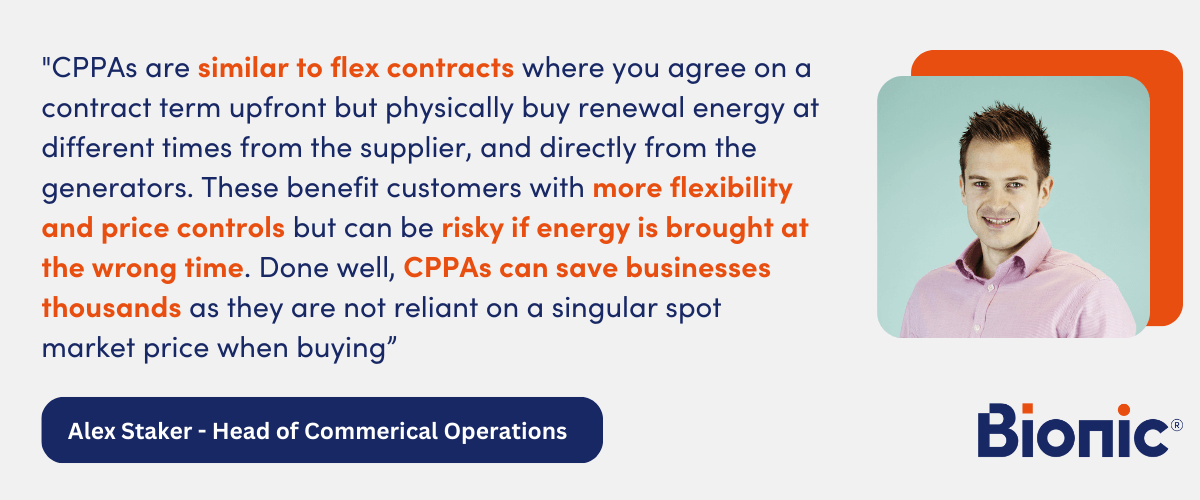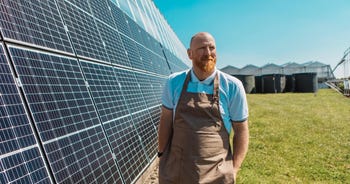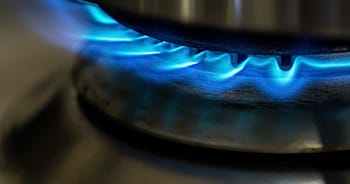What is a Corporate Power Purchase Agreement (CPPA), and what does it mean for businesses?
When searching for a new business energy deal, it's best to lock in rates as soon as you can - since historically, they go up, not down over a long period.
But if you're producing self-generated renewable energy and not totally reliant on the grid, your business could explore a Corporate Power Purchase Agreement (CPPA) to help keep the lights on instead. Although it's risky business, some companies find CPPAs to be a good option when it comes to long-term cost savings.
In this Bionic guide, we’ll explore everything there is to know about CPPAs, how they can affect your business, and how you can go about getting one if you feel it's the right choice.

30-second Summary
- Corporate Power Purchase Agreements (CPPAs) allow businesses to purchase electricity directly from renewable energy generators over a fixed term of 10-25 years.
- There are two main types of CPPAs: Physical (direct electricity delivery) and Virtual (financial contracts).
- Steps for obtaining a CPPA include assessing energy needs, researching renewable providers, consulting with an energy consultant, reviewing legal aspects, considering infrastructure and grid connection, monitoring energy usage, and reviewing and renewing the agreement.
- CPPAs offer cost stability, access to renewable energy, long-term price hedging, and a positive brand image. But they also pose risks as market rates could drop during the contract period.
- CPPAs are not exclusive to large businesses; small and medium-sized companies can also benefit.
What is a CPPA?
A Corporate Power Purchase Agreement — or a CPPA — is a specific type of Power Purchase Agreement (PPA) where businesses or corporations directly purchase electricity from a renewable energy generator.
In a CPPA, the corporate buyer agrees to purchase a set amount of electricity from a renewable project — like wind, solar or biomass — at a pre-agreed price over a fixed term, usually between 10-25 years. The goal for many businesses and organisations is to secure a long-term, stable price for renewable energy as well as helping to contribute toward a lower carbon footprint.

What are the different CPPAs?
There are currently two main types of CPPAs: Physical or direct CPPAs and virtual or synthetic CPPAs.
Physical or direct CPPAs
In these agreements, the corporate buyer physically receives and takes delivery of the electricity generated by the renewable project. This renewable energy is typically delivered directly to the corporate buyer through the grid. This can sometimes be quite complicated due to transmission considerations and regulations.
Virtual or synthetic CPPAs
These are financial contracts rather than physical electricity delivery contracts. The corporate buyer and the renewable energy project agree upon a fixed price for the electricity.
When the market price is above the agreed price, the generator pays the difference to the corporate buyer, and vice versa when the market price is below the agreed price. In essence, the corporate buyer still pays their utility bill, but the financial contract helps hedge against electricity price volatility.
What should you consider when getting a CPPA?
Understanding what you need to know about a CPPA can be hard, especially with the amount of jargon being used around it. Here’s a step-by-step to all the important bits you need to know:
Access your energy needs and goals
Analyse your company’s current energy consumption and use utility bills and energy management systems to look at electricity usage patterns, peak demand periods, and annual consumption.
It’s also a good idea to project any future needs your business may have. If you know that in a few years, you’ll be switching from petrol and diesel cars to electric vehicles that need charging points, you know you’ll be consuming more energy than in previous years.
Determine what percentage of your energy you want sourced from renewables. Is the aim 100% or a certain fraction? Make sure to work this out.
Research renewable providers
Look at the size of the projects, their operation history and expected energy production. Where they’re located on the map can also impact the price you’ll pay — some projects may be located closer to your business operations, which could reduce transmission costs or losses.
Make sure to do your research on providers that you’re potentially thinking about. Investigate if they have a track record of successful partnerships and what their reliability is like.
Speak with an energy consultant
The role of an energy consultant is to use their knowledge and skills to find ways for businesses to optimise their energy usage. Consultants with a strong background in renewable energy markets can provide insights into market trends and pricing.
They can also guide you on potential challenges, such as regulatory changes or market risks.
Legal review
You need to ensure all contract clauses address scenarios like underproduction by the renewable project, dispute resolution and 'force majeure events' (certain acts, events or circumstances beyond the control of whoever signed the agreement, such as natural disasters or worldwide pandemics) — while it might seem like a hassle now, it could save you any issues in the long run.
It’s also important that businesses understand the implications and the costs of terminating a CPPA before it expires.
Infrastructure and grid connection
For physical CPPAs, you may need upgrades to your existing electrical infrastructure so it can handle new renewable energy sources.
The local grid's capacity and the cost to connect a new renewable project to the grid can impact how likely the project will succeed and the cost-effectiveness of a CPPA.
Monitor and optimise
You may need to install an advanced energy management system or software to track real-time energy production and consumption. Based on this data, adjusting your operational hours or processes to align with energy availability — particularly if you’re relying heavily on renewables — may be the answer.
Review and renew
Assess if the renewable project consistently met its obligations and if the CPPA helped achieve the sustainability goals of the business.
If it did, and as the CPPA nears its end, re-evaluate the energy market. Prices, technologies and regulatory requirements evolve — especially over the span of 10 to 25 years — and this may present new opportunities or challenges for the next contract.
How does a CPPA work?
Here’s a breakdown of how a CPPA works and the steps a corporation will have to take:
- Initiating an agreement — A corporation identifies its renewable energy objectives, either to meet sustainability targets, reduce its carbon footprint, protect against future energy price volatility, or a combination of these reasons. They then seek a renewable energy project (e.g., wind, solar) that aligns with their needs.
- Contract negotiations — The corporate buyer and the renewable energy developer negotiate terms. This includes the price, contract durations, volume of energy and any other technical and financial specifics.
- Physical vs Virtual CPPAs — Then it’s time to choose between a Physical or Virtual CPPA. This should be in line with whichever is more suited to the business and its needs.
- Settlement process (for Virtual CPPAs) — When the agreed price (strike price) is above the market price, the corporate buyer pays the energy producer the difference. When the market price is above the agreed price, the energy producer pays the corporate buyer the difference.
- Renewable energy certificates (RECs) — Alongside the electricity produced, renewable projects generate something known as a Renewable Energy Certificate (RECs). One REC represents one megawatt-hour (MWh) of electricity generated from a renewable source. In a CPPA, corporations can also purchase RECs to claim they're using renewable energy. Depending on the agreement, RECs can be bundled with the energy or traded separately.
- End of agreement — Similar to standard PPAs, at the end of the contract term, the corporate buyer may have options like renewing the agreement, purchasing the energy infrastructure, or ending the agreement.
CPPAs allow businesses and corporations to directly engage with renewable energy producers, secure stable energy costs and promote green energy development.
What are the benefits of a Corporate Power Purchase Agreement?
Corporate Power Purchase Agreements offer a wide range of benefits to customers, including:
- Cost stability — With a fixed price or a known pricing structure, businesses can more accurately forecast their energy costs over the term of the agreement, often spanning years or even decades. Traditional energy prices can be volatile due to things like geopolitical events, supply chain disruptions, or regulatory changes. A CPPA protects from unpredictable market conditions.
- Access to renewable energy — CPPAs provide corporations with direct access to large-scale renewable energy projects, so they can source cleaner energy that might not be available through standard energy deals. Corporations can choose specific renewable energy sources, like wind, solar, or hydro, that align with their sustainability goals.
- Long-term price hedging — By locking in energy prices for the long term, businesses can protect against energy price increases for the duration of the contract, providing financial stability. CPPAs can also be a helpful tool in the broader financial strategy of a company to help manage and reduce operational and market risks associated with rising energy costs.
- Positive brand image — Demonstrating a commitment to renewable energy and sustainability can enhance a company's image in the eyes of consumers, investors, and stakeholders.
Are there any risks with CPPAs?
If the last few years have taught us anything about the energy market, it's that prices are unpredictable. And if you're locked into a CPPA then you've agreed to pay a set price for the duration of your contract - sometimes for up to 15 years or more. So if market rates for business energy drop dramatically during your contract period, you'll be locked into paying higher rates than the current market prices until the end of your contract.
There is no way to predict what could happen, so if you sign - make sure you understand the risks completely before putting pen to paper.
Are CPPAs only for large businesses?
No CPPAs are not only for large businesses; small and medium-sized companies may enter into a CPPA if they have the capacity and desire to commit to purchasing renewable energy over the long term.
While large corporations and organisations have been some of the early adopters of Corporate Power Purchase Agreements due to their significant energy consumption and larger resources, CPPAs are increasingly being used by businesses of all sizes.
Some renewable energy providers have developed solutions to make CPPAs more accessible to smaller businesses by adjusting demand or offering more flexible contract solutions.
How long does a Corporate Power Purchase Agreement typically last?
The duration of these contracts can vary widely, but they’ll typically be negotiated between the buyer and the renewable energy provider. There’s no fixed standard period for CPPAs - but they generally fall within a range of 10-25 years.
Get your business set with Bionic
At Bionic, whilst we can't help you directly arrange a CPPA — as this needs to be done directly through a supplier — we can advise you on understanding how business energy works and when to lock in a new energy contract.
Get in touch today with the Bionic team today to help sort a new contract for your business electricity and business gas. Or head over to our energy guides section to read more topics on business energy from our experts.








